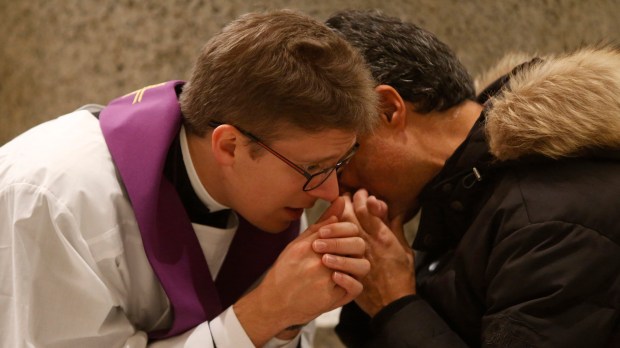Once during catechism class, I asked children whether they know how to start a confession. “You should start by committing a sin,” said one smart aleck. But must we actually confess every single sin we’ve committed?
The confession of “grave” sins
We’ve been all created to live in a loving communion with God. It’s been our purpose ever since we received the grace of baptism and what we call the “present grace.” The source of joy and peace, this intimate relationship can be broken by sin. A person who seeks to reconcile with God and the Church must show contrition and “… confess to a priest all the unconfessed grave sins he remembers after having carefully examined his conscience” (Catechism of the Catholic Church § 1493).
So, what we must confess are the “grave” sins, the ones that have destroyed our communion with God. There are three conditions that define a “grave” sin:
- Serious violation of the Lord’s commandments
- Our clear awareness of the gravity of the act
- Our freely willed choice to sin
We are responsible for maintaining a well-formed conscience, so that we are aware of what constitutes grave sin.
Confession of “venal” sins
Without actually breaking our bond with God, some sins still lead to estrangement. While these actions or omissions do not fundamentally undermine our goodwill toward the Lord, they progressively remove us from His presence.
Venial sins are offenses against charity, God’s love for us and our love for our neighbor. Such wounds against love. though not fatal to the life of grace, may have far-reaching consequences. A grain of sand in the eye can cause more pain than a greater quantity of sand piled on a foot! The Church invites us to confess these so-called “venial” sins, because they do damage to our relationship with God and with others. What’s more, “the regular confession of our venial sins helps us to form our conscience, fight against evil tendencies, let ourselves be healed by Christ and progress in the life of the Spirit” (Catechism of the Catholic Church§ 1458).
Don’t put yourself first
Finally, it’s possible that our lifestyle, without being reprehensible, lacks clear priorities: we put ourselves and our appetites first. St. Paul tells us: “… whether you eat or drink or whatever you do, do it all for the glory of God” (1 Cor. 10:31). There are so many things we do for ourselves out of habit, instead of doing them for the glory of God!
What God desires above all, is that we honor Him in all circumstances. In this sense, putting all means at our disposal to glorify Him is more righteous than empty penitential practices, like giving something up that we do not care that much about. We must totally transform the way we think and act, so God always comes first.
Father Nicolas Buttet

Read more:
How often should a Catholic go to confession?

